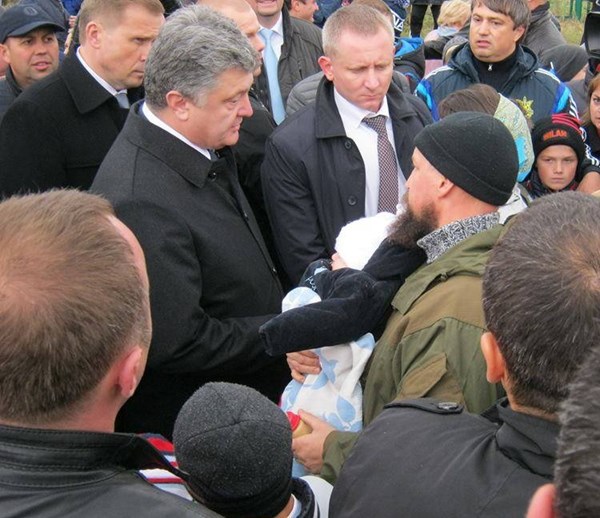Foreign soldiers who fought for Ukraine have been abandoned by Kiev
Photo: A Russian citizen and veteran of the War in the Donbas hands President Poroshenko an application for Ukrainian citizenship in November of 2015. His request was denied in February of this year. He is the husband of a Ukrainian citizen, and the father of ten Ukrainian children. He is now facing deportation to Russia.
On Monday, March 28th, Ukrainian President Petro Poroshenko signed a decree amending the procedure for granting citizenship to foreigners serving in the Ukrainian Armed Forces, a move that came in response to mounting pressure on the Ukrainian President to provide citizenship to foreigners who fought in the war in the Donbas against pro-Russian separatists. To many who answered Kiev’s call to come to the Donbas to defend Ukraine against Russian aggression, however, Poroshenko’s decree on Monday is little more than a slap in the face, as they still find themselves facing deportation from the country.
When Russian-backed separatists started the war in eastern Ukraine, hundreds of foreigners flocked to the country in defense of Kiev. As the majority of foreign volunteers came from Belarus and Russia, countries that share visa-free regimes with Ukraine, most entered the country as “tourists”, with a valid stay of up to 90 days. Not only have most foreign volunteers from these two countries overstayed their authorized period, most are unable to return to their home countries due to fear of reprisal.
While Poroshenko’s amendment on Monday has been presented as a gesture of respect and indebtedness to the foreigners who fought for Ukraine’s freedom, a closer examination of the document reveals that the law has, in fact, changed very little, and the vast majority of foreign fighters continue to retain no legal immigration status in Ukraine. In particular, the amendment addresses law № 215, which previously allowed the President to grant citizenship to a foreigner who served in the military for a period of five years. On Monday, Poroshenko merely decreased the required amount of time to three years, despite promises to grant citizenship to foreign fighters after a period of two months. As the majority of foreign fighters entered service no more than two years ago, the amendment does nothing to change their immigration status.
What is more, when the influx of foreigners first arrived in Ukraine to fight against the Russian-backed separatists in the Donbas region, they served in a variety of National Guard groups that later became integrated into the Ukrainian Ministry of Interior, not the Ministry of Defense. It was not until January and February of this year that the foreigners who fought in the Donbas began “officially” serving in the Armed Forces of Ukraine, meaning that such soldiers will not be eligible for citizenship until January of 2019, at the earliest.
While the prospect of immigration was not the motivation for foreigners fighting in the Donbas, since the war first erupted in the Spring of 2014, Ukrainian officials have repeatedly made public statements about their readiness to grant citizenship and legal immigration status for all foreigners who fought on the side of the Ukrainian government during the war in the country’s east.
In October of 2014, for example, Ukrainian Minister of Internal Affairs Arsen Avakov stated that foreigners fighting on the side of Kiev would be granted Ukrainian citizenship at their request.
Two months later, Poroshenko gave an address in front of the Verkhovna Rada in which he stated “I want to give a warm welcome to my brothers-in-arms. Concerning your appeal to the President of Ukraine on account of granting Ukrainian citizenship to Belarusians and Russians, who, with arms in their hands, together with you, defended the honor and independence of the country, I, as promised, will sign the decree which will grant them Ukrainian citizenship. They passed this exam.”
Similarly, in January of 2015, Ukrainian Defense Minister Stepan Poltorak stated that he would personally help such individuals obtain citizenship. "There are people who come to us and protect our land. I will personally assist them in obtaining citizenship," Poltorak said.
It is clear that Poroshenko’s decree on Monday is a far cry from what was promised. Most of these foreign fighters are unable to return to their home countries due to the consequences that await them. For example, Belarusian KGB Chairman Valery Vakulchik made it clear in October of 2014 that any Belarus citizen caught participating in the hostilities in Ukraine faces 7 years in prison, and one would assume that Russian citizens would face a similar penalty.
With no legal immigration status and an inability or unwillingness to return to their home countries, many veterans of the war in the Donbas find themselves in a dire situation. To make matters worse, some of these soldiers suffered debilitating injuries while fighting for Ukraine, and are not being taken care of by the government for whom they received their wounds. Due to their injuries, they are physically incapable of continuing to serve in the Ukrainian Armed Forces, and will therefore be unable to serve for the period of three years required to obtain Ukrainian citizenship, as stipulated by Poroshenko’s decree.
The foreign soldiers and many others feel as though the government in Kiev has broken its promise. These fighters answered Ukraine’s call, and have become outcasts in the country they defended.
